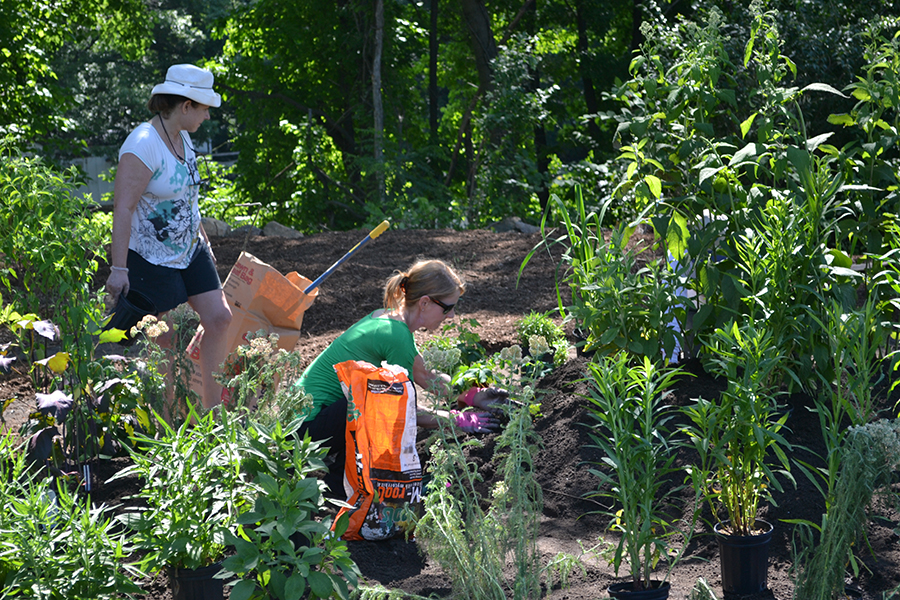
April 21, 2023| Environment, People
By: Caitlin Doran
Earth Day is held annually on April 22. It’s a day to celebrate the natural world and talk about our critical role in protecting our environment. First held on April 22, 1970, it now includes a wide range of events and initiatives coordinated globally at Earthday.org.
Earth Day is a great day to “think globally, and act locally.” To help inspire you, here are our staff picks for things you can do to help protect our lake and environment on April 22 and every day!
Donna says: maintain your septic system! More than half of Lake Hopatcong utilizes septic systems. Malfunctioning septic systems can release bacteria, viruses, chemicals, and excess nutrients into the water column, eventually entering streams, rivers, and lakes. This has a negative impact on water quality, potentially hurting/killing wildlife and increasing weed growth and the likelihood of an algal bloom. For important information on how to maintain your septic system, check out these resources on the EPA’s website.
Holly says: plant natives! Native plants play an integral part in the world's ecosystem and are important for healthy populations of birds, native bees, butterflies, bats, and many mammals. They provide significant support for many pollinators, such as the Monarch Butterfly, whose populations are under stress. They play a crucial role in the production of fruits and vegetables, as well as the health of plant and wildlife communities. Natives can even improve water quality! With deeper root systems than grass, native plants effectively hold soil in place and help filter out pollution from stormwater runoff, allowing heavy rainwater to be absorbed into soils rather than overflowing into storm drainage systems, protecting our waterways, and reducing flooding. You can purchase native plants from our upcoming Native Plant Sale, beginning on April 28!
Kyle says: plant a shoreline buffer! Buffers are a great way to help protect Lake Hopatcong right in your own “backyard.” A shoreline buffer (sometimes called a vegetative buffer or a riparian buffer) is a section of natural vegetation along the shoreline, intended slow runoff and help catch nutrients, sediments, and other pollutants before they can reach the lake. Planting vegetative buffers, or simply allowing your landscape along the shoreline to return to its natural state, is critical for lakefront properties, as it helps prevent sediments, pesticides, and large amounts of phosphorus and nitrogen from entering the lake. In addition, they also increase biodiversity by providing habitat for local wildlife and pollinators and make your yard less inviting for Canada geese! Downloading a free copy of Landscaping at the Water’s Edge, An Ecological Approach is a useful (and beautiful) publication, that can help anyone who is ready to install an ecologically-friendly shoreline buffer!
Michela says: install a rain barrel! A rain barrel is placed under a gutter's downspout in order to collect water from the roof. You can then use this water to water your garden! Harvesting rainwater is an excellent way to conserve potable water (and save some money!). By collecting rainwater, homeowners also help to reduce stormwater runoff, which can otherwise lead to flooding and polluting of local waterways. This is especially important in cities that have combined sewer outfalls, where the stormwater and sanitary sewer lines are not separated, and excess water is often diverted into local waterways. Rutgers has an excellent how-to for making your own rain barrel, or you can purchase one locally from a company like Green Mojo Eco Consulting.
Caitlin says: avoid single-use plastic and participate in a local litter cleanup! Globally, we produce 300 million tons of plastic each year, half of which is for single-use items, like straws, bags, packaging, and beverage bottles. That’s nearly the equivalent of the weight of the entire human population! We are producing more single-use plastic – plastic that is manufactured to be immediately thrown away, often used for mere minutes – than we can ever hope to recycle. This plastic, more often than not, ends up in landfills or as litter in the environment; and while it’s only in use for a few minutes, it is effectively around forever, since plastic doesn’t break down. Instead, it breaks up, into smaller and smaller pieces called microplastics, which are ingested by animals, and ultimately by humans who eat those animals. The good news is single-use plastic is very avoidable! Keep a stash of reusable bags in your car and invest in reusable, portable bottles, straws, and cutlery. You can also help us remove the plastic that’s already in the environment by joining us at a cleanup! Our next cleanup is tomorrow, Earth Day, April 22 at 8:30am along Mount Arlington Blvd. in Landing. Meet us at Nixon School and get ready to make a difference!
Globally, the theme for Earth Day 2023 is “Invest in Our Planet.” It’s a reminder that through an investment of time, energy, and resources, we can protect our one planet and home. When you make a donation of time, energy, or dollars to the Lake Hopatcong Foundation, we work to protect the environment here in our backyard. Make a donation – and a difference – today, in honor of Earth Day!

December 05, 2025
Fundraising, People

December 04, 2025
Education, Environment

December 03, 2025
Community, Environment